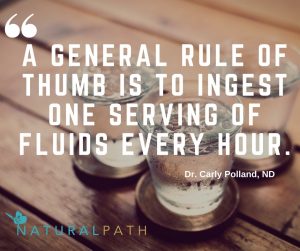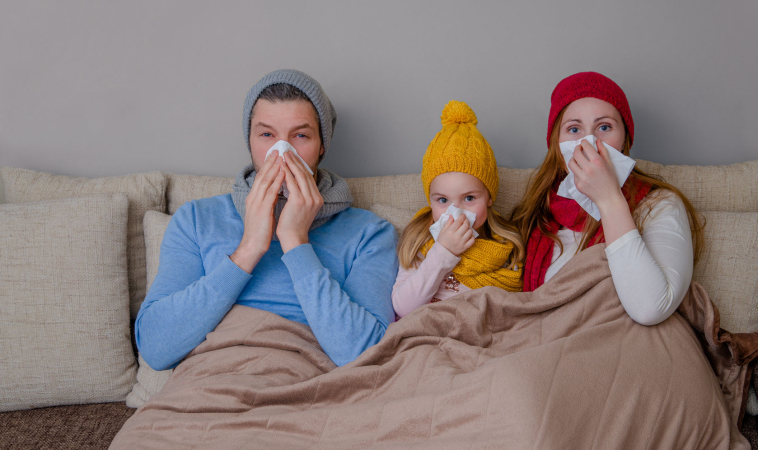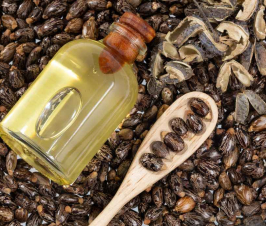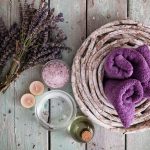 “Do I have a cold or the flu? Do I need to go the doctor? Should I be on antibiotics?”
“Do I have a cold or the flu? Do I need to go the doctor? Should I be on antibiotics?”
The differences between a cold and the flu are often small. Both are caused by a virus and not by bacteria. Both have similar symptoms such as a sore throat, cough, and a runny nose. Typically, flu symptoms are more severe and also include fever, muscle aches, headaches, and lack of energy. If you have a fever, it is more likely that you have the flu. If you have a runny nose, it is more likely that you have a cold. However, you can have the flu without a fever and with a runny nose. This makes it hard to distinguish between the cold and flu on occasion. However, there are lab tests to diagnose the flu.1
But who really needs to know the difference between a cold and the flu?
For people who are generally healthy, it is often not important to get a definitive diagnosis. The infection will resolve on its own without any treatment. However, the flu can be much more dangerous than a cold. The flu can lead to complications such as inflammation of the heart, muscles, or brain; secondary bacterial infection such as pneumonia, sinus infections, or ear infections; or worsening of another medical condition. These complications can be severe, requiring hospitalization and they may even be life-threatening.2
People who are at higher risk of complications with the flu need to know if they are dealing with a cold or the flu, as this will affect treatment decisions. This includes young children, the elderly, pregnant women, people with compromised immune function, people with a certain medical condition such as asthma, chronic obstructive pulmonary disease, other diseases affecting the lungs, congestive heart failure, myocarditis, other cardiovascular diseases, and pre-existing bacterial infections.3
Please visit your doctor if you suspect you have the flu and you are at high risk of complications. Your doctor can distinguish between a cold or the flu and direct your care to minimize complications.
Whether you have the cold or the flu, there are many natural treatment options that can help ease your symptoms, stimulate your immune system to promote healing, and all without the nasty side effects of over the counter medications.
FOR ALL SYMPTOMS:
REST
Your immune system requires a lot of energy to fight off a virus. The best thing we can do is rest our body so that we aren’t directing energy away from our immune system. This is easier said than done, though. Taking time off of work can be hard even if you have sick days. Whenever possible, choose to use your sick days. We live in a society that has a “nose to the grindstone” mentality. We believe rest and relaxation are lazy and irresponsible, so we push ourselves constantly. Your physiology, however, disagrees. Rest and relaxation are very important to maintaining a healthy and functional body. So the next time you get sick, check your beliefs and choose to rest. You will probably realize that your lack of rest is what got you sick in the first place.
HYDRATE
When you have a viral infection, you should be constantly hydrating your body. A general rule of thumb is to ingest one serving of fluids every hour. What do I mean by one serving of fluid? It could be a glass of water, a cup of herbal tea, or a bowl of broth. The idea is to keep the fluids coming. You want to avoid fluids high in sugar (like juice or soda) as that can dampen your immune response. If plain water doesn’t do it for you, try adding flavoring to your water in the form of a flavored vitamin C powder. Vitamin C will also support your immune system. If herbal tea doesn’t sound appealing, try hot honey lemon water.
FOR NASAL CONGESTION:
SINUS RINSE
Use a Neti Pot or my personal favorite, Neil Med Sinus Rinse. Use this twice a day to clear out your sinuses and soothe your mucus membranes. This can help prevent a sinus infection.
STEAM INHALATION
Steam can help open up your sinuses to get the congestion out. Simply holding a cup of hot tea under your nose can help or you can create a mini steam sauna using a large bowl of hot water and a towel. You can use essential oils such as eucalyptus to help open up your sinuses. Use 1-2 drops in a large bowl of water. You can also pour 10 drops of eucalyptus essential oil on the bottom of your shower and take a hot shower to create a sauna experience.
FOR A SORE THROAT:
SALT GARGLE
Mix ½ teaspoon of salt in 1 cup of warm water. Gargle for 15-30 seconds per mouthful. Repeat every 2 hours.
TOPICAL CASTOR OIL
Apply a nickel-sized amount of castor oil to the front part of your upper neck and apply a heat source on top. Leave on for about 20 minutes. Rub excess castor oil into skin or wash off with soap and water. Castor oil promotes lymphatic circulation to the area, which increases the number of immune cells in an area and stimulates healing.
DEMULCENT TEA
Warm herbal tea made with demulcent herbs can be very soothing to sore throats. Demulcents herbs include marshmallow, cinnamon, slippery elm, and licorice. Traditional Medicinals makes Throat Coat Tea, which you can find at most grocery stores. If you have high blood pressure, however, this tea is not for you. Look for another demulcent tea that does not contain licorice.
OTHER TIDBITS TO KNOW:
Never use antibiotics to treat the cold. It won’t work. Instead, you will damage your gut bacteria leading to digestive issues and promote antibiotic resistance.
- If you have a high fever (above 101), go see your doctor.
- If your symptoms don’t decrease in severity after 7 days, go see your doctor.
- If your breathing becomes affected, go see your doctor.
References:
- Center for Disease Control. Cold vs Flu. https://www.cdc.gov/flu/about/qa/coldflu.htm
- Center for Disease Control. Flu Symptoms & Complications. https://www.cdc.gov/flu/about/qa/coldflu.htm
- Center for Disease Control. Influenza Signs and Symptoms and the Role of Laboratory Diagnosis. https://www.cdc.gov/flu/professionals/diagnosis/labrolesprocedures.htm
 Dr. Carly Polland is a Naturopathic Doctor who is passionate about teaching people how to transform their health to live a life full of strength, energy, and vitality. She combines modern science and ancient natural wisdom to help people overcome chronic disease and reclaim vibrant health. She specializes in autoimmune disease, digestive disorders, women’s health, and mental health. To learn about her private practice, visit www.bioadaptivemedicine.com.
Dr. Carly Polland is a Naturopathic Doctor who is passionate about teaching people how to transform their health to live a life full of strength, energy, and vitality. She combines modern science and ancient natural wisdom to help people overcome chronic disease and reclaim vibrant health. She specializes in autoimmune disease, digestive disorders, women’s health, and mental health. To learn about her private practice, visit www.bioadaptivemedicine.com.

















